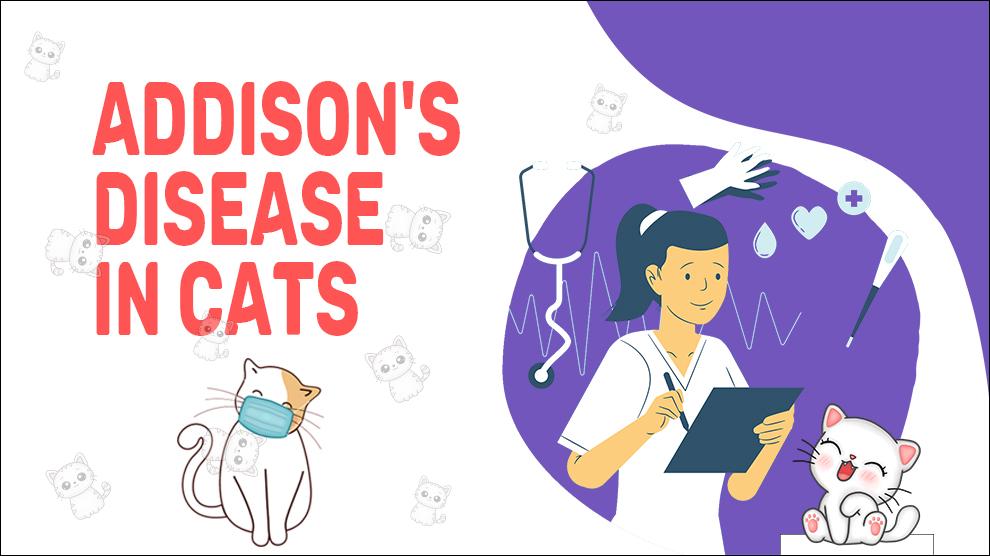What Is Addison’s Disease In Cats?
Addison's disease in cats is a rare condition that occurs when the adrenal glands don't produce enough hormones, particularly cortisol, and aldosterone.
This disease is also known as hypoadrenocorticism or chronic adrenal insufficiency.
The condition is often difficult to diagnose since the symptoms may be nonspecific or intermittent, making it challenging to identify the underlying cause of the disease.
Clinical Signs Of Addison’s Disease In Cats
The symptoms of Addison's disease in cats can be subtle and may develop slowly over time.
Some of the most common symptoms of the disease include:
- Loss of appetite
- Vomiting
- Diarrhea
- Lethargy
- Weight loss
- Increased thirst
- Dehydration
- Weakness
- Depression
- Collapse
- Shaking
- Low body temperature
- Decreased heart rate
- Weak Pulse Rate
- Frequent Urination
- Blood In Stool
- Hair loss
- Abdominal Pain
- Loss Of Muscle Mass
These symptoms are often non-specific, and they can be associated with a wide range of medical conditions. Therefore, it's essential to consult a veterinarian to determine the underlying cause of the symptoms.
How Is Hypoadrenocorticism (Addison’s Disease) Treated In Cats?
The treatment of Addison's disease in cats involves hormone replacement therapy.
The therapy aims to replace the deficient hormones, cortisol, and aldosterone, with synthetic versions of the hormones.
The medications used in hormone replacement therapy include:
- Prednisolone - This medication is used to replace cortisol in the body.
- Fludrocortisone - This medication is used to replace aldosterone in the body.
The medication dosages will vary based on the cat's weight and the severity of the disease. Your veterinarian will also monitor your cat's hormone levels regularly to determine the appropriate medication dosage.
Home Remedies For Addison’s Disease In Cats
There are no home remedies for Addison's disease in cats. Hormone replacement therapy with synthetic cortisol and aldosterone medications is the standard treatment for the disease.
Attempting to treat the condition with home remedies could be dangerous and potentially life-threatening for your cat.
Therefore, it's essential to seek veterinary care if you suspect that your cat may have Addison's disease.
How To Prevent Addison’s Disease In Cats?
Preventing Addison's disease in cats is not always possible. However, some steps can be taken to minimize the risk of developing the disease.
These include:
- Regular veterinary check-ups - Regular check-ups with a veterinarian can help detect any medical conditions early, including Addison's disease.
- Avoiding prolonged steroid use - Prolonged use of steroids can suppress the adrenal glands, leading to Addison's disease. Therefore, it's essential to avoid using steroids unless prescribed by a veterinarian.
Affected Cat Breeds Of Addison’s Disease
Addison's disease in cats is relatively rare, and it can occur in any breed. However, certain cat breeds have a higher risk of developing the disease.
These breeds include:
- Siamese
- Burmese
- Maine Coon
Causes For Addison’s Disease In Cats
Causes:
Addison's disease in cats is caused by a dysfunction in the adrenal glands. The adrenal glands are responsible for producing cortisol and aldosterone hormones.
When these glands don't function correctly, the levels of these hormones in the body decrease, leading to the development of Addison's disease.
Some of the factors that can cause the adrenal glands to malfunction include:
- Autoimmune disorders - Addison's disease in cats can occur when the body's immune system mistakenly attacks the adrenal glands, damaging their function.
- Adrenal gland tumors - In rare cases, tumors may develop in the adrenal glands, causing the glands to malfunction and produce insufficient hormones.
- Infections - Certain bacterial or fungal infections can damage the adrenal glands, leading to Addison's disease.
- Medications - Prolonged use of certain medications, such as steroids, can suppress the function of the adrenal glands, leading to Addison's disease.
When To See A Vet For Addison’s Disease In Cats?
It's essential to consult a veterinarian if you notice any unusual symptoms in your cat, such as loss of appetite, vomiting, diarrhea, lethargy, or weakness.
These symptoms may indicate a range of medical conditions, including Addison's disease.
If your cat has been diagnosed with Addison's disease, it's crucial to follow your veterinarian's recommendations for hormone replacement therapy and regular check-ups to monitor your cat's hormone levels and overall health.
Food Suggestions For Addison’s Disease In Cats
There are no specific dietary recommendations for cats with Addison's disease.
However, a balanced and nutritious diet is essential for maintaining your cat's overall health and well-being.
Ensure that your cat's diet contains high-quality protein, essential vitamins and minerals, and sufficient water.
Consult with your veterinarian if you have any concerns about your cat's diet or nutritional needs.
Conclusion
Addison's disease in cats is a rare but potentially life-threatening condition. The disease can be difficult to diagnose, and the symptoms may be nonspecific.
Therefore, it's essential to consult a veterinarian if you notice any unusual symptoms in your cat.
With prompt diagnosis and appropriate treatment, cats with Addison's disease can lead healthy and happy lives.
It's also essential to follow preventive measures, such as regular veterinary check-ups, and avoiding prolonged use of steroids, to minimize the risk of developing the disease.











